Watched April 23-29, 2007
Tsuchi / Earth (Tomu Uchida, 1939)
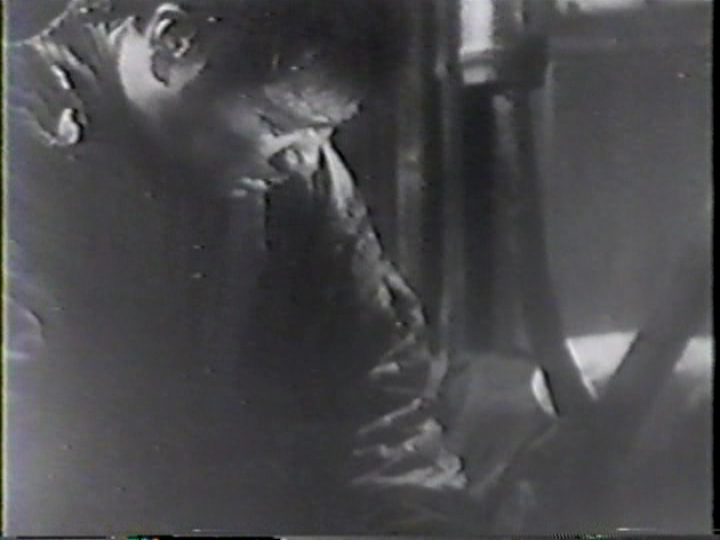 Famed "realist" film about country life, made by Uchida without studio approval or cash. Shot with donated reel ends (and a bit of funds) on weekends and vacation days. A widower with two children lives with his his father-in-law. The family grows rice on rented land, and it is hard to make ends meet, especially when weather is uncooperative. The relationship between the man and his father-in-law is strained -- and grows worse when the old man accidentally allows the family's house to burn down. This film was believed to be lost, but in the 60s an incomplete copy --
Famed "realist" film about country life, made by Uchida without studio approval or cash. Shot with donated reel ends (and a bit of funds) on weekends and vacation days. A widower with two children lives with his his father-in-law. The family grows rice on rented land, and it is hard to make ends meet, especially when weather is uncooperative. The relationship between the man and his father-in-law is strained -- and grows worse when the old man accidentally allows the family's house to burn down. This film was believed to be lost, but in the 60s an incomplete copy -- 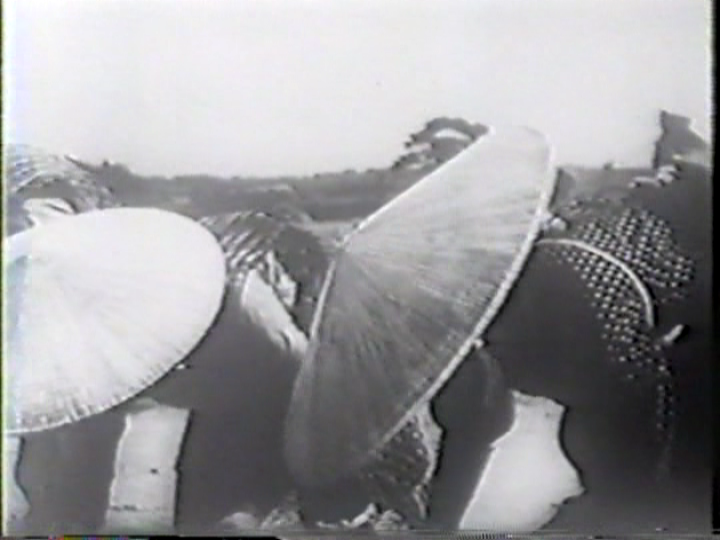 sub-titled in German and missing first and last reels -- was found in a German archive. Recently, a somewhat longer (but still incomplete) version was discovered in a Russian film archive. The version I saw was the one found in Germany.
sub-titled in German and missing first and last reels -- was found in a German archive. Recently, a somewhat longer (but still incomplete) version was discovered in a Russian film archive. The version I saw was the one found in Germany.
More pictures:
http://i9.photobucket.com/albums/a59/mkerpan/earth/tsuchi01.png
http://i9.photobucket.com/albums/a59/mkerpan/earth/tsuchi03.png
http://i9.photobucket.com/albums/a59/mkerpan/earth/tsuchi04.png
http://i9.photobucket.com/albums/a59/mkerpan/earth/tsuchi05.png
http://i9.photobucket.com/albums/a59/mkerpan/earth/tsuchi06.png
http://i9.photobucket.com/albums/a59/mkerpan/earth/tsuchi07.png
http://i9.photobucket.com/albums/a59/mkerpan/earth/tsuchi09.png
http://i9.photobucket.com/albums/a59/mkerpan/earth/tsuchi10.png
http://i9.photobucket.com/albums/a59/mkerpan/earth/tsuchi11.png
Koibumi / Love Letter (Kinuyo Tanaka, 1953)
 Tanaka's first film as a director. The good -- exceptionally fine cinematography by long-time Naruse collaborator Hiroshi Suzuki and a fine cast (including Masayuki Mori, Yoshiko Kuga, Kyoko Kagawa et al.). The bad -- a rather poor script by Kinoshita, based on a book by the same author responsible for Naruse's least interesting film. Tanaka, while not helped by the script, does not show an especially good sense of cinematic timing here.
Tanaka's first film as a director. The good -- exceptionally fine cinematography by long-time Naruse collaborator Hiroshi Suzuki and a fine cast (including Masayuki Mori, Yoshiko Kuga, Kyoko Kagawa et al.). The bad -- a rather poor script by Kinoshita, based on a book by the same author responsible for Naruse's least interesting film. Tanaka, while not helped by the script, does not show an especially good sense of cinematic timing here. 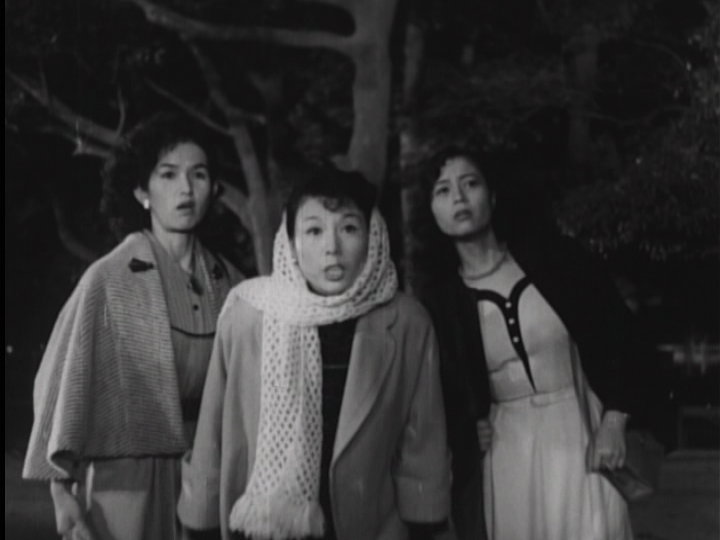 Her casting choices are also a bit weird -- with Kuga and Mori (who is 20 years older than Kuga) playing people who were supposedly grade school (and high school) classmates -- and who went their separate ways after they left school.
Her casting choices are also a bit weird -- with Kuga and Mori (who is 20 years older than Kuga) playing people who were supposedly grade school (and high school) classmates -- and who went their separate ways after they left school.
More pictures:
http://i9.photobucket.com/albums/a59/mkerpan/koibumi/koibumi01.png
http://i9.photobucket.com/albums/a59/mkerpan/koibumi/koibumi02.png
http://i9.photobucket.com/albums/a59/mkerpan/koibumi/koibumi03.png
http://i9.photobucket.com/albums/a59/mkerpan/koibumi/koibumi04.png
http://i9.photobucket.com/albums/a59/mkerpan/koibumi/koibumi05.png
http://i9.photobucket.com/albums/a59/mkerpan/koibumi/koibumi06.png
http://i9.photobucket.com/albums/a59/mkerpan/koibumi/koibumi07.png
http://i9.photobucket.com/albums/a59/mkerpan/koibumi/koibumi09.png
http://i9.photobucket.com/albums/a59/mkerpan/koibumi/koibumi10.png
http://i9.photobucket.com/albums/a59/mkerpan/koibumi/koibumi13.png
Nigorie / Muddy Water (Tadashi Imai, 1953)
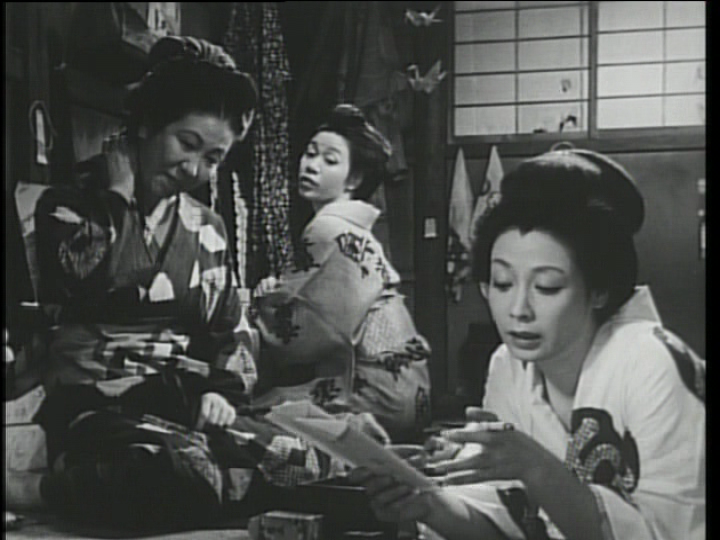 A three part-film based on short stories about the difficult lot of women in the early Meiji era. This is the film that swept almost all the Japanese awards for the year of Tokyo Story and Ugetsu (among others great films) -- and lost to the fairly inconsequential Gate of Hell at the Cannes Festival. Imai and Kinoshita (and not Ozu, Naruse or Mizoguchi) were the most popular (and critically acclaimed) directors of the Japanese Golden Age of the 50s. While I find the contemporaneous adulation for Kinoshita beyond my understanding, I have found the few Imai films I've seen fairly impressive. And this is no exception.
A three part-film based on short stories about the difficult lot of women in the early Meiji era. This is the film that swept almost all the Japanese awards for the year of Tokyo Story and Ugetsu (among others great films) -- and lost to the fairly inconsequential Gate of Hell at the Cannes Festival. Imai and Kinoshita (and not Ozu, Naruse or Mizoguchi) were the most popular (and critically acclaimed) directors of the Japanese Golden Age of the 50s. While I find the contemporaneous adulation for Kinoshita beyond my understanding, I have found the few Imai films I've seen fairly impressive. And this is no exception.
This film has an interesting structure. Part 1 lasts around 20 minutes, part 2 around 40, and part 3 around 60. And part 1 is the most muted and slow moving -- while part 3 is the most noisy and (literally) in your face.
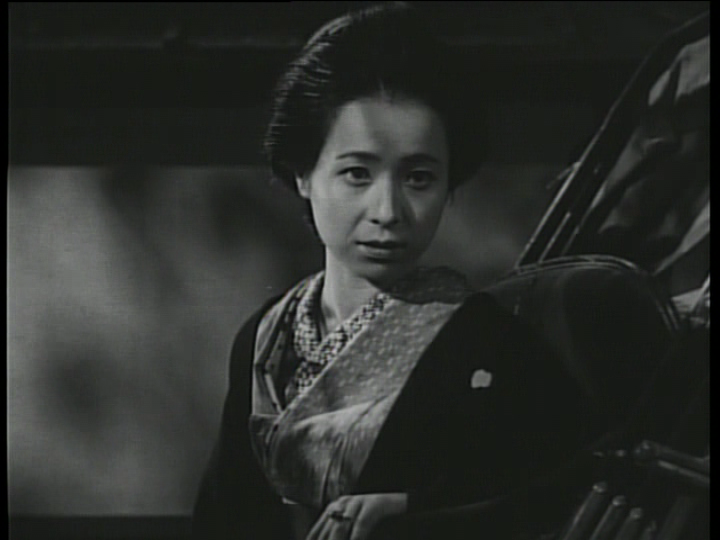 Part 1 tells of a young woman returning home for the first time after her arranged marriage. Parental pleasure at seeing her vanishes when it turns out she hates the marriage and wants to come home -- for good. Her mother responds with weepy lamentations and the father with sarcastic hostility. She decides to leave again -- and a rickshaw is called. As she rides (and then walks) with the rickshaw man, the two talk -- presumably exchanging the stories of their lives. They arrive at her destination -- and part. Unfortunately, this is unsubtitled -- and it will be a good while (if ever) before I figure out the details of the long concluding conversation.
Part 1 tells of a young woman returning home for the first time after her arranged marriage. Parental pleasure at seeing her vanishes when it turns out she hates the marriage and wants to come home -- for good. Her mother responds with weepy lamentations and the father with sarcastic hostility. She decides to leave again -- and a rickshaw is called. As she rides (and then walks) with the rickshaw man, the two talk -- presumably exchanging the stories of their lives. They arrive at her destination -- and part. Unfortunately, this is unsubtitled -- and it will be a good while (if ever) before I figure out the details of the long concluding conversation.
http://i9.photobucket.com/albums/a59/mkerpan/nigorie/nigorie01.png
http://i9.photobucket.com/albums/a59/mkerpan/nigorie/nigorie03.png
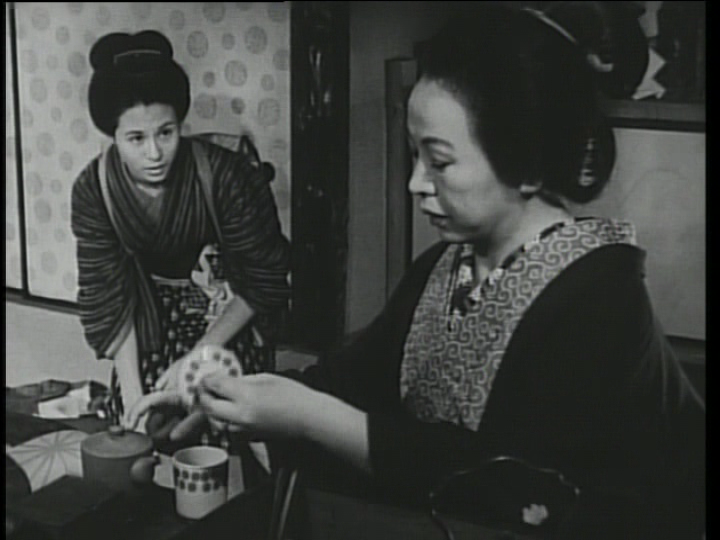 Part 2 is a bit reminiscent of Cinderella (up to a point). Yoshiko Kuga is a servant in the house of a rich merchant family, consisting of an imperious mother, a mostly absent father, two very pretty (and even more spoiled) daughters, and a rather irresponsible (but handsome) college-going son. Not only is Kuga over-worked and poorly paid, but her employer is quite stingy -- with her.
Part 2 is a bit reminiscent of Cinderella (up to a point). Yoshiko Kuga is a servant in the house of a rich merchant family, consisting of an imperious mother, a mostly absent father, two very pretty (and even more spoiled) daughters, and a rather irresponsible (but handsome) college-going son. Not only is Kuga over-worked and poorly paid, but her employer is quite stingy -- with her. 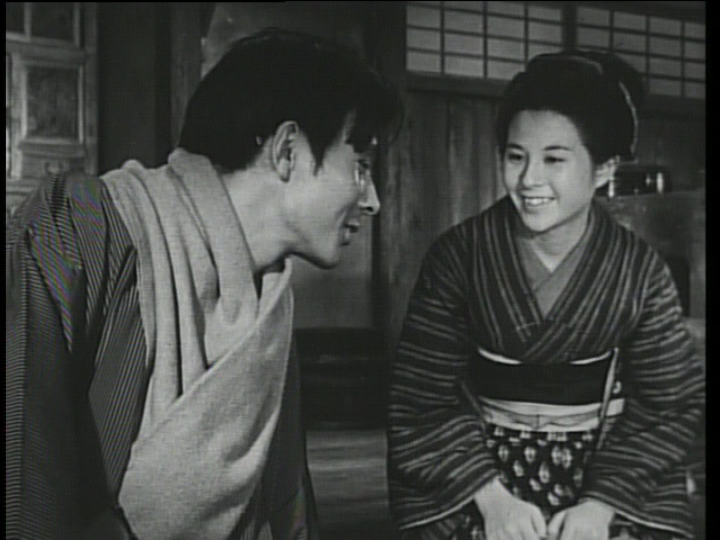 As it turns out, Kuga is supporting her own family with her meager earnings (her father can no longer work, due to grave illness). When her family's situation worsens, Kuga steals some money to give to her mother. I shan't say what happens next -- but will provide some screen shots:
As it turns out, Kuga is supporting her own family with her meager earnings (her father can no longer work, due to grave illness). When her family's situation worsens, Kuga steals some money to give to her mother. I shan't say what happens next -- but will provide some screen shots:
http://i9.photobucket.com/albums/a59/mkerpan/nigorie/nigorie04.png
http://i9.photobucket.com/albums/a59/mkerpan/nigorie/nigorie05.png
http://i9.photobucket.com/albums/a59/mkerpan/nigorie/nigorie06.png
http://i9.photobucket.com/albums/a59/mkerpan/nigorie/nigorie08.png
http://i9.photobucket.com/albums/a59/mkerpan/nigorie/nigorie10.png
http://i9.photobucket.com/albums/a59/mkerpan/nigorie/nigorie11.png
http://i9.photobucket.com/albums/a59/mkerpan/nigorie/nigorie12.png
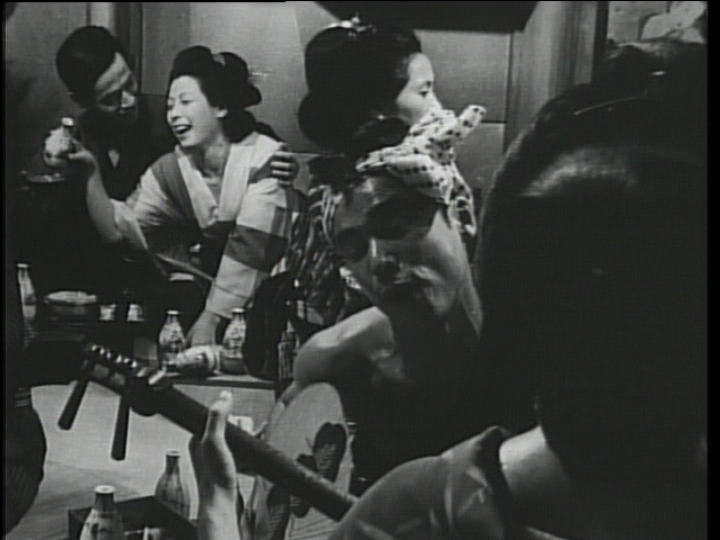 Part 3 is centered around a Yoshiwara prostitute played by Chikage Awashima. She has a patron she is in love with (So Yamamura), but is also a big favorite with local gangsters. In addition, she has a creepy, stalker-ish ex-client -- now married and living in poverty with Haruko Sugimura and a young son.
Part 3 is centered around a Yoshiwara prostitute played by Chikage Awashima. She has a patron she is in love with (So Yamamura), but is also a big favorite with local gangsters. In addition, she has a creepy, stalker-ish ex-client -- now married and living in poverty with Haruko Sugimura and a young son. 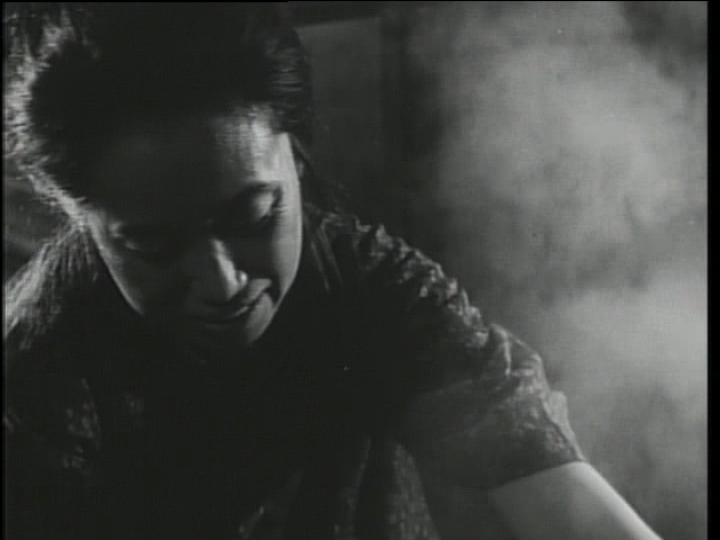 While the cinematography (by Shunichiro Nakao, Imai's regular cameraman -- who also shot Naruse's wonderful "Spring Awakens) is uniformly fine throughout this film -- it is most impressive in this last section.
While the cinematography (by Shunichiro Nakao, Imai's regular cameraman -- who also shot Naruse's wonderful "Spring Awakens) is uniformly fine throughout this film -- it is most impressive in this last section.
Examples:
http://i9.photobucket.com/albums/a59/mkerpan/nigorie/nigorie13.png
http://i9.photobucket.com/albums/a59/mkerpan/nigorie/nigorie15.png
http://i9.photobucket.com/albums/a59/mkerpan/nigorie/nigorie16.png
http://i9.photobucket.com/albums/a59/mkerpan/nigorie/nigorie17.png
http://i9.photobucket.com/albums/a59/mkerpan/nigorie/nigorie18.png
http://i9.photobucket.com/albums/a59/mkerpan/nigorie/nigorie19.png
http://i9.photobucket.com/albums/a59/mkerpan/nigorie/nigorie21.png
http://i9.photobucket.com/albums/a59/mkerpan/nigorie/nigorie23.png
http://i9.photobucket.com/albums/a59/mkerpan/nigorie/nigorie24.png
http://i9.photobucket.com/albums/a59/mkerpan/nigorie/nigorie25.png
http://i9.photobucket.com/albums/a59/mkerpan/nigorie/nigorie26.png
http://i9.photobucket.com/albums/a59/mkerpan/nigorie/nigorie27.png
http://i9.photobucket.com/albums/a59/mkerpan/nigorie/nigorie28.png
http://i9.photobucket.com/albums/a59/mkerpan/nigorie/nigorie29.png
http://i9.photobucket.com/albums/a59/mkerpan/nigorie/nigorie30.png
Not quite as perfect as Tokyo Story, perhaps -- but a more impressive film overall than Ugetsu (and at least as good as Mizoguchi's best 1953 film Gion Festival Music / A Geisha).
Don Kikhot (Grigori Kozintsev, 1957)
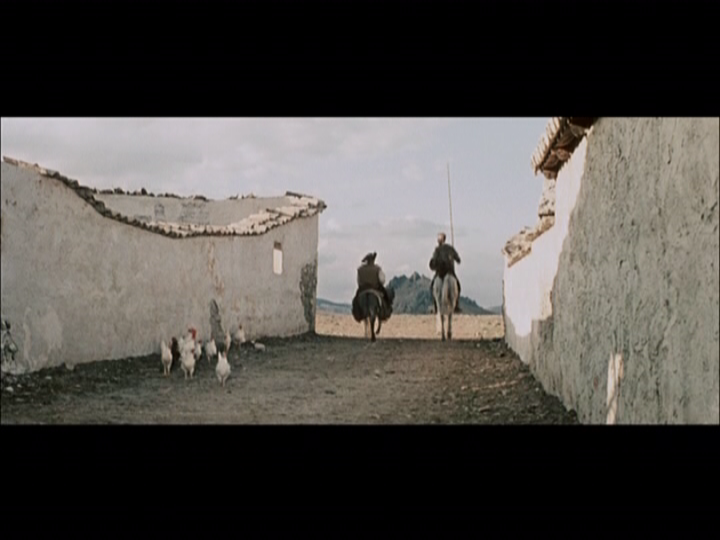 Probably the best adaptation ever of Cervantes' classic tale. Nikolai Cherkasov and Yuri Tolubeyev are visually perfect for their roles as the Knight of the Rueful Countenance and Conqueror or Lions and his trusty companion Sancho Panza.
Probably the best adaptation ever of Cervantes' classic tale. Nikolai Cherkasov and Yuri Tolubeyev are visually perfect for their roles as the Knight of the Rueful Countenance and Conqueror or Lions and his trusty companion Sancho Panza. 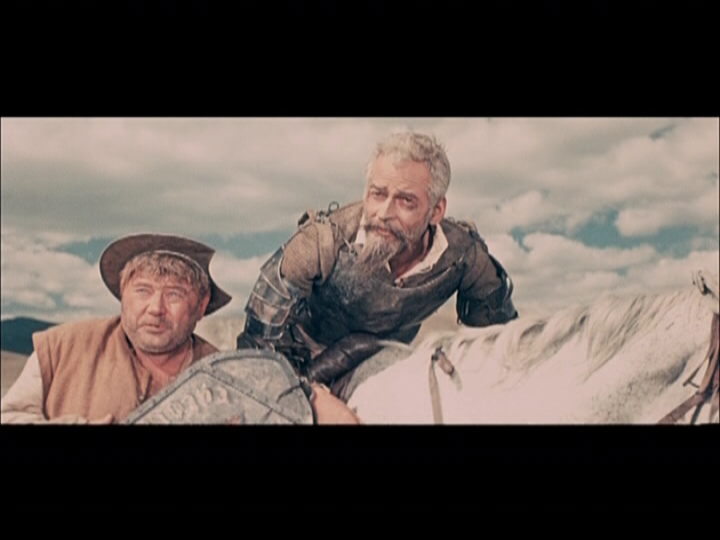 The new Ruscico release has somewhat restored (but still quite faded) color -- and (at long) last proper Sovscope (2.35:1) formatting. Not quite the equal of his last two films, "Hamlet" and "King Lear", but very fine.
The new Ruscico release has somewhat restored (but still quite faded) color -- and (at long) last proper Sovscope (2.35:1) formatting. Not quite the equal of his last two films, "Hamlet" and "King Lear", but very fine.
Additional screenshots:
http://i9.photobucket.com/albums/a59/mkerpan/quixote/quixote01.png
http://i9.photobucket.com/albums/a59/mkerpan/quixote/quixote02.png
http://i9.photobucket.com/albums/a59/mkerpan/quixote/quixote04.png
http://i9.photobucket.com/albums/a59/mkerpan/quixote/quixote05.png
http://i9.photobucket.com/albums/a59/mkerpan/quixote/quixote06.png
http://i9.photobucket.com/albums/a59/mkerpan/quixote/quixote07.png
http://i9.photobucket.com/albums/a59/mkerpan/quixote/quixote08.png
http://i9.photobucket.com/albums/a59/mkerpan/quixote/quixote09.png
http://i9.photobucket.com/albums/a59/mkerpan/quixote/quixote10.png
http://i9.photobucket.com/albums/a59/mkerpan/quixote/quixote11.png
http://i9.photobucket.com/albums/a59/mkerpan/quixote/quixote12.png
http://i9.photobucket.com/albums/a59/mkerpan/quixote/quixote14.png
About Love: Shanghai (ZHANG Yibai, 2005)
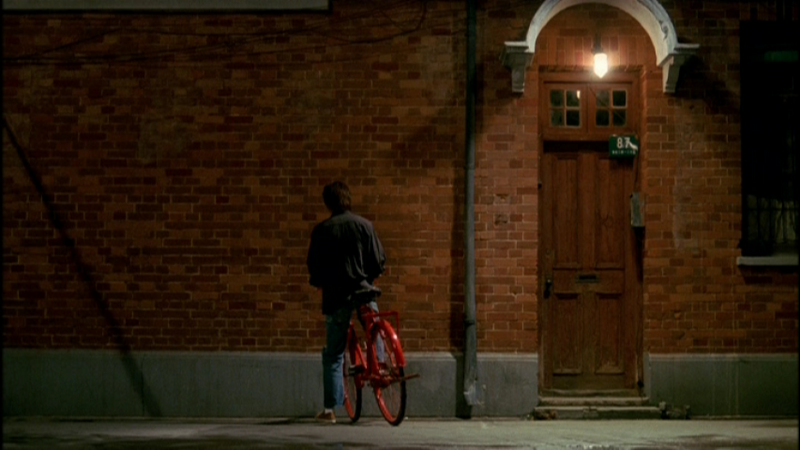 Re-watched this section of the three-part omnibus film (About Love). I think ZHANG Yibai is definitely a director to keep an eye on. Despite his start in commercials and music videos, he displays a truly cinematic sense of vision -- and time.
Re-watched this section of the three-part omnibus film (About Love). I think ZHANG Yibai is definitely a director to keep an eye on. Despite his start in commercials and music videos, he displays a truly cinematic sense of vision -- and time. 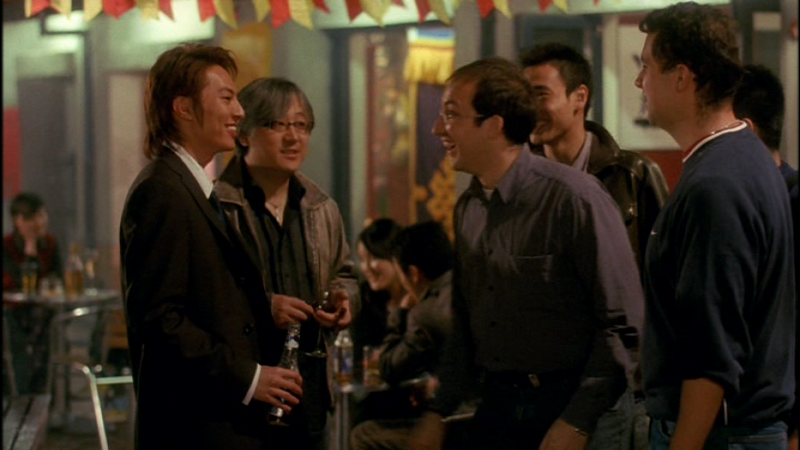 A Japanese college student comes to Japan to do some immersion studying of Chinese. While there he rents a room above a store run by a woman and her high school daughter. A film in Chinese, Japanese, English -- and two words of Spanish.
A Japanese college student comes to Japan to do some immersion studying of Chinese. While there he rents a room above a store run by a woman and her high school daughter. A film in Chinese, Japanese, English -- and two words of Spanish.
My initial comments on the film --
Watched March 26 - April 1, 2007
A few more pictures:
http://i9.photobucket.com/albums/a59/mkerpan/about_love/about06.png
http://i9.photobucket.com/albums/a59/mkerpan/about_love/about07.png
http://i9.photobucket.com/albums/a59/mkerpan/about_love/about09.png
 Famed "realist" film about country life, made by Uchida without studio approval or cash. Shot with donated reel ends (and a bit of funds) on weekends and vacation days. A widower with two children lives with his his father-in-law. The family grows rice on rented land, and it is hard to make ends meet, especially when weather is uncooperative. The relationship between the man and his father-in-law is strained -- and grows worse when the old man accidentally allows the family's house to burn down. This film was believed to be lost, but in the 60s an incomplete copy --
Famed "realist" film about country life, made by Uchida without studio approval or cash. Shot with donated reel ends (and a bit of funds) on weekends and vacation days. A widower with two children lives with his his father-in-law. The family grows rice on rented land, and it is hard to make ends meet, especially when weather is uncooperative. The relationship between the man and his father-in-law is strained -- and grows worse when the old man accidentally allows the family's house to burn down. This film was believed to be lost, but in the 60s an incomplete copy --  sub-titled in German and missing first and last reels -- was found in a German archive. Recently, a somewhat longer (but still incomplete) version was discovered in a Russian film archive. The version I saw was the one found in Germany.
sub-titled in German and missing first and last reels -- was found in a German archive. Recently, a somewhat longer (but still incomplete) version was discovered in a Russian film archive. The version I saw was the one found in Germany.More pictures:
http://i9.photobucket.com/albums/a59/mkerpan/earth/tsuchi01.png
http://i9.photobucket.com/albums/a59/mkerpan/earth/tsuchi03.png
http://i9.photobucket.com/albums/a59/mkerpan/earth/tsuchi04.png
http://i9.photobucket.com/albums/a59/mkerpan/earth/tsuchi05.png
http://i9.photobucket.com/albums/a59/mkerpan/earth/tsuchi06.png
http://i9.photobucket.com/albums/a59/mkerpan/earth/tsuchi07.png
http://i9.photobucket.com/albums/a59/mkerpan/earth/tsuchi09.png
http://i9.photobucket.com/albums/a59/mkerpan/earth/tsuchi10.png
http://i9.photobucket.com/albums/a59/mkerpan/earth/tsuchi11.png
Koibumi / Love Letter (Kinuyo Tanaka, 1953)
 Tanaka's first film as a director. The good -- exceptionally fine cinematography by long-time Naruse collaborator Hiroshi Suzuki and a fine cast (including Masayuki Mori, Yoshiko Kuga, Kyoko Kagawa et al.). The bad -- a rather poor script by Kinoshita, based on a book by the same author responsible for Naruse's least interesting film. Tanaka, while not helped by the script, does not show an especially good sense of cinematic timing here.
Tanaka's first film as a director. The good -- exceptionally fine cinematography by long-time Naruse collaborator Hiroshi Suzuki and a fine cast (including Masayuki Mori, Yoshiko Kuga, Kyoko Kagawa et al.). The bad -- a rather poor script by Kinoshita, based on a book by the same author responsible for Naruse's least interesting film. Tanaka, while not helped by the script, does not show an especially good sense of cinematic timing here.  Her casting choices are also a bit weird -- with Kuga and Mori (who is 20 years older than Kuga) playing people who were supposedly grade school (and high school) classmates -- and who went their separate ways after they left school.
Her casting choices are also a bit weird -- with Kuga and Mori (who is 20 years older than Kuga) playing people who were supposedly grade school (and high school) classmates -- and who went their separate ways after they left school.More pictures:
http://i9.photobucket.com/albums/a59/mkerpan/koibumi/koibumi01.png
http://i9.photobucket.com/albums/a59/mkerpan/koibumi/koibumi02.png
http://i9.photobucket.com/albums/a59/mkerpan/koibumi/koibumi03.png
http://i9.photobucket.com/albums/a59/mkerpan/koibumi/koibumi04.png
http://i9.photobucket.com/albums/a59/mkerpan/koibumi/koibumi05.png
http://i9.photobucket.com/albums/a59/mkerpan/koibumi/koibumi06.png
http://i9.photobucket.com/albums/a59/mkerpan/koibumi/koibumi07.png
http://i9.photobucket.com/albums/a59/mkerpan/koibumi/koibumi09.png
http://i9.photobucket.com/albums/a59/mkerpan/koibumi/koibumi10.png
http://i9.photobucket.com/albums/a59/mkerpan/koibumi/koibumi13.png
Nigorie / Muddy Water (Tadashi Imai, 1953)
 A three part-film based on short stories about the difficult lot of women in the early Meiji era. This is the film that swept almost all the Japanese awards for the year of Tokyo Story and Ugetsu (among others great films) -- and lost to the fairly inconsequential Gate of Hell at the Cannes Festival. Imai and Kinoshita (and not Ozu, Naruse or Mizoguchi) were the most popular (and critically acclaimed) directors of the Japanese Golden Age of the 50s. While I find the contemporaneous adulation for Kinoshita beyond my understanding, I have found the few Imai films I've seen fairly impressive. And this is no exception.
A three part-film based on short stories about the difficult lot of women in the early Meiji era. This is the film that swept almost all the Japanese awards for the year of Tokyo Story and Ugetsu (among others great films) -- and lost to the fairly inconsequential Gate of Hell at the Cannes Festival. Imai and Kinoshita (and not Ozu, Naruse or Mizoguchi) were the most popular (and critically acclaimed) directors of the Japanese Golden Age of the 50s. While I find the contemporaneous adulation for Kinoshita beyond my understanding, I have found the few Imai films I've seen fairly impressive. And this is no exception.This film has an interesting structure. Part 1 lasts around 20 minutes, part 2 around 40, and part 3 around 60. And part 1 is the most muted and slow moving -- while part 3 is the most noisy and (literally) in your face.
 Part 1 tells of a young woman returning home for the first time after her arranged marriage. Parental pleasure at seeing her vanishes when it turns out she hates the marriage and wants to come home -- for good. Her mother responds with weepy lamentations and the father with sarcastic hostility. She decides to leave again -- and a rickshaw is called. As she rides (and then walks) with the rickshaw man, the two talk -- presumably exchanging the stories of their lives. They arrive at her destination -- and part. Unfortunately, this is unsubtitled -- and it will be a good while (if ever) before I figure out the details of the long concluding conversation.
Part 1 tells of a young woman returning home for the first time after her arranged marriage. Parental pleasure at seeing her vanishes when it turns out she hates the marriage and wants to come home -- for good. Her mother responds with weepy lamentations and the father with sarcastic hostility. She decides to leave again -- and a rickshaw is called. As she rides (and then walks) with the rickshaw man, the two talk -- presumably exchanging the stories of their lives. They arrive at her destination -- and part. Unfortunately, this is unsubtitled -- and it will be a good while (if ever) before I figure out the details of the long concluding conversation.http://i9.photobucket.com/albums/a59/mkerpan/nigorie/nigorie01.png
http://i9.photobucket.com/albums/a59/mkerpan/nigorie/nigorie03.png
 Part 2 is a bit reminiscent of Cinderella (up to a point). Yoshiko Kuga is a servant in the house of a rich merchant family, consisting of an imperious mother, a mostly absent father, two very pretty (and even more spoiled) daughters, and a rather irresponsible (but handsome) college-going son. Not only is Kuga over-worked and poorly paid, but her employer is quite stingy -- with her.
Part 2 is a bit reminiscent of Cinderella (up to a point). Yoshiko Kuga is a servant in the house of a rich merchant family, consisting of an imperious mother, a mostly absent father, two very pretty (and even more spoiled) daughters, and a rather irresponsible (but handsome) college-going son. Not only is Kuga over-worked and poorly paid, but her employer is quite stingy -- with her.  As it turns out, Kuga is supporting her own family with her meager earnings (her father can no longer work, due to grave illness). When her family's situation worsens, Kuga steals some money to give to her mother. I shan't say what happens next -- but will provide some screen shots:
As it turns out, Kuga is supporting her own family with her meager earnings (her father can no longer work, due to grave illness). When her family's situation worsens, Kuga steals some money to give to her mother. I shan't say what happens next -- but will provide some screen shots:http://i9.photobucket.com/albums/a59/mkerpan/nigorie/nigorie04.png
http://i9.photobucket.com/albums/a59/mkerpan/nigorie/nigorie05.png
http://i9.photobucket.com/albums/a59/mkerpan/nigorie/nigorie06.png
http://i9.photobucket.com/albums/a59/mkerpan/nigorie/nigorie08.png
http://i9.photobucket.com/albums/a59/mkerpan/nigorie/nigorie10.png
http://i9.photobucket.com/albums/a59/mkerpan/nigorie/nigorie11.png
http://i9.photobucket.com/albums/a59/mkerpan/nigorie/nigorie12.png
 Part 3 is centered around a Yoshiwara prostitute played by Chikage Awashima. She has a patron she is in love with (So Yamamura), but is also a big favorite with local gangsters. In addition, she has a creepy, stalker-ish ex-client -- now married and living in poverty with Haruko Sugimura and a young son.
Part 3 is centered around a Yoshiwara prostitute played by Chikage Awashima. She has a patron she is in love with (So Yamamura), but is also a big favorite with local gangsters. In addition, she has a creepy, stalker-ish ex-client -- now married and living in poverty with Haruko Sugimura and a young son.  While the cinematography (by Shunichiro Nakao, Imai's regular cameraman -- who also shot Naruse's wonderful "Spring Awakens) is uniformly fine throughout this film -- it is most impressive in this last section.
While the cinematography (by Shunichiro Nakao, Imai's regular cameraman -- who also shot Naruse's wonderful "Spring Awakens) is uniformly fine throughout this film -- it is most impressive in this last section.Examples:
http://i9.photobucket.com/albums/a59/mkerpan/nigorie/nigorie13.png
http://i9.photobucket.com/albums/a59/mkerpan/nigorie/nigorie15.png
http://i9.photobucket.com/albums/a59/mkerpan/nigorie/nigorie16.png
http://i9.photobucket.com/albums/a59/mkerpan/nigorie/nigorie17.png
http://i9.photobucket.com/albums/a59/mkerpan/nigorie/nigorie18.png
http://i9.photobucket.com/albums/a59/mkerpan/nigorie/nigorie19.png
http://i9.photobucket.com/albums/a59/mkerpan/nigorie/nigorie21.png
http://i9.photobucket.com/albums/a59/mkerpan/nigorie/nigorie23.png
http://i9.photobucket.com/albums/a59/mkerpan/nigorie/nigorie24.png
http://i9.photobucket.com/albums/a59/mkerpan/nigorie/nigorie25.png
http://i9.photobucket.com/albums/a59/mkerpan/nigorie/nigorie26.png
http://i9.photobucket.com/albums/a59/mkerpan/nigorie/nigorie27.png
http://i9.photobucket.com/albums/a59/mkerpan/nigorie/nigorie28.png
http://i9.photobucket.com/albums/a59/mkerpan/nigorie/nigorie29.png
http://i9.photobucket.com/albums/a59/mkerpan/nigorie/nigorie30.png
Not quite as perfect as Tokyo Story, perhaps -- but a more impressive film overall than Ugetsu (and at least as good as Mizoguchi's best 1953 film Gion Festival Music / A Geisha).
Don Kikhot (Grigori Kozintsev, 1957)
 Probably the best adaptation ever of Cervantes' classic tale. Nikolai Cherkasov and Yuri Tolubeyev are visually perfect for their roles as the Knight of the Rueful Countenance and Conqueror or Lions and his trusty companion Sancho Panza.
Probably the best adaptation ever of Cervantes' classic tale. Nikolai Cherkasov and Yuri Tolubeyev are visually perfect for their roles as the Knight of the Rueful Countenance and Conqueror or Lions and his trusty companion Sancho Panza.  The new Ruscico release has somewhat restored (but still quite faded) color -- and (at long) last proper Sovscope (2.35:1) formatting. Not quite the equal of his last two films, "Hamlet" and "King Lear", but very fine.
The new Ruscico release has somewhat restored (but still quite faded) color -- and (at long) last proper Sovscope (2.35:1) formatting. Not quite the equal of his last two films, "Hamlet" and "King Lear", but very fine.Additional screenshots:
http://i9.photobucket.com/albums/a59/mkerpan/quixote/quixote01.png
http://i9.photobucket.com/albums/a59/mkerpan/quixote/quixote02.png
http://i9.photobucket.com/albums/a59/mkerpan/quixote/quixote04.png
http://i9.photobucket.com/albums/a59/mkerpan/quixote/quixote05.png
http://i9.photobucket.com/albums/a59/mkerpan/quixote/quixote06.png
http://i9.photobucket.com/albums/a59/mkerpan/quixote/quixote07.png
http://i9.photobucket.com/albums/a59/mkerpan/quixote/quixote08.png
http://i9.photobucket.com/albums/a59/mkerpan/quixote/quixote09.png
http://i9.photobucket.com/albums/a59/mkerpan/quixote/quixote10.png
http://i9.photobucket.com/albums/a59/mkerpan/quixote/quixote11.png
http://i9.photobucket.com/albums/a59/mkerpan/quixote/quixote12.png
http://i9.photobucket.com/albums/a59/mkerpan/quixote/quixote14.png
About Love: Shanghai (ZHANG Yibai, 2005)
 Re-watched this section of the three-part omnibus film (About Love). I think ZHANG Yibai is definitely a director to keep an eye on. Despite his start in commercials and music videos, he displays a truly cinematic sense of vision -- and time.
Re-watched this section of the three-part omnibus film (About Love). I think ZHANG Yibai is definitely a director to keep an eye on. Despite his start in commercials and music videos, he displays a truly cinematic sense of vision -- and time.  A Japanese college student comes to Japan to do some immersion studying of Chinese. While there he rents a room above a store run by a woman and her high school daughter. A film in Chinese, Japanese, English -- and two words of Spanish.
A Japanese college student comes to Japan to do some immersion studying of Chinese. While there he rents a room above a store run by a woman and her high school daughter. A film in Chinese, Japanese, English -- and two words of Spanish.My initial comments on the film --
Watched March 26 - April 1, 2007
A few more pictures:
http://i9.photobucket.com/albums/a59/mkerpan/about_love/about06.png
http://i9.photobucket.com/albums/a59/mkerpan/about_love/about07.png
http://i9.photobucket.com/albums/a59/mkerpan/about_love/about09.png
Comments